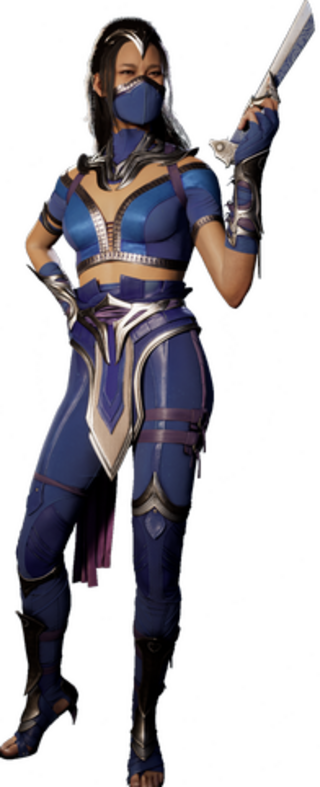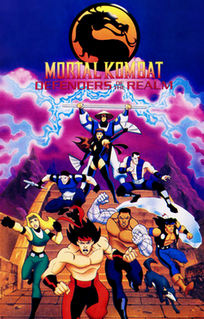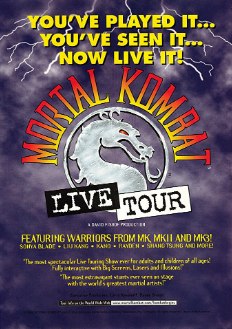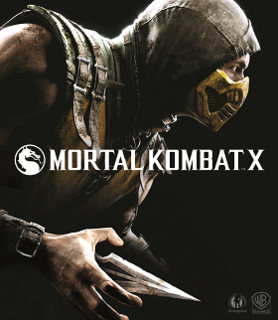
Mortal Kombat: Annihilation is a 1997 American martial arts fantasy film directed by John R. Leonetti in his directorial debut from a screenplay by Brent V. Friedman and Bryce Zabel. Based on the Mortal Kombat video game franchise, it is the second installment in the Mortal Kombat film series and a sequel to the original 1995 film, which Leonetti served as the cinematographer of. Largely an adaptation of the video game Mortal Kombat 3 (1995), Annihilation follows Liu Kang and his allies as they attempt to stop the malevolent Shao Kahn from conquering Earthrealm. It stars Robin Shou as Liu, Talisa Soto as Kitana, James Remar as Rayden, Sandra Hess as Sonya Blade, Lynn Red Williams as Jax, and Brian Thompson as Kahn. Only Shou and Soto reprise their roles, with the rest of the characters recast from the previous film.

Smoke is a fictional character in the Mortal Kombat fighting game franchise by Midway Games and NetherRealm Studios. He debuted in Mortal Kombat II (1993) as a hidden opponent and became a secret playable character in Mortal Kombat 3 (1995), making him the franchise's first unlockable fighter. In keeping with his namesake, he is distinguished by the smoke fumes emitting from his body and his smoke-based powers.

Mileena is a fictional character in the Mortal Kombat fighting game franchise by Midway Games and NetherRealm Studios. Introduced in Mortal Kombat II (1993), she is a clone of the Edenian princess Kitana, created with the blood of the fictional Tarkatan species. Her creation results in her developing the deformed facial features of the Tarkatan, which she conceals with a veil. A power-hungry, unstable villain throughout most of the series, Mileena uses a pair of sai as her primary weapon. She is also the love interest of the Tarkatan warrior Baraka.

Jade is a fictional character in the Mortal Kombat fighting game franchise by Midway Games and NetherRealm Studios. She debuted in Mortal Kombat II (1993) as a hidden opponent and first became playable in Ultimate Mortal Kombat 3 (1995). Her primary weapon is a steel bō staff.

Kitana is a fictional character in the Mortal Kombat fighting game franchise by Midway Games and NetherRealm Studios. Debuting in Mortal Kombat II (1993), she is a royal from the fictional realm of Edenia. Her primary weapon is a pair of steel fans, which she uses for most of her special attacks.

Kung Lao is a fictional character in the Mortal Kombat fighting game franchise by Midway Games and NetherRealm Studios. A Shaolin monk, he debuted in Mortal Kombat II (1993). He is depicted as a primary hero in the series, including as one of the protagonists of the action-adventure spin-off Mortal Kombat: Shaolin Monks (2005). The character is also a descendant of the Great Kung Lao, the first Earthrealm champion of the Mortal Kombat tournament. His main weapon is a metal hat, which he uses for both melee and projectile attacks.

Mortal Kombat 3 is a fighting video game developed by Midway / Atari Games and first released into arcades in 1995. It is the third entry in the Mortal Kombat series and is the sequel to Mortal Kombat II. As in the previous games, it has a cast of characters that players choose from and guide through a series of battles against other opponents. The game avoids the tournament storyline of its predecessors, as various warriors instead fight against the returning Shao Kahn, who has resurrected his bride Sindel and started an invasion of Earthrealm.

Scorpion is a fictional character in the Mortal Kombat fighting game franchise by Midway Games and NetherRealm Studios. An undead ninja, he is principally defined by his quest to avenge the deaths of himself, his family, and his clan. His primary weapon is a kunai spear, which he uses to harpoon opponents.

Mortal Kombat II is a fighting game originally produced by Midway for the arcades in 1993. It was later ported to multiple home systems, including the MS-DOS, Amiga, Game Boy, Game Gear, Sega Genesis, 32X, Sega Saturn, Super Nintendo Entertainment System, and PlayStation only in Japan, mostly in licensed versions developed by Probe Entertainment and Sculptured Software and published by Acclaim Entertainment.

Mortal Kombat: Deception is a fighting video game developed and published by Midway as the sixth installment of the Mortal Kombat (MK) video game franchise. It was released for the PlayStation 2 and Xbox in October 2004, for the GameCube in March 2005 and later ported for the PlayStation Portable under the title Mortal Kombat: Unchained in November 2006. Mortal Kombat: Deception follows the storyline from the fifth installment, Deadly Alliance. Its story centers on the revival of the Dragon King Onaga, who attempts to conquer the realms featured in the series after defeating the sorcerers Quan Chi and Shang Tsung, the main antagonists in the previous game, and the Thunder God Raiden, defender of Earthrealm. The surviving warriors from the previous titles join forces to confront Onaga.

Sonya Blade is a fictional character in the Mortal Kombat fighting game franchise by Midway Games and NetherRealm Studios. She debuted in the original 1992 game as the roster's sole female fighter. Inspired by martial artist Cynthia Rothrock, she is a military officer with the Special Forces.

Ultimate Mortal Kombat 3 is a fighting game in the Mortal Kombat series, developed and released by Midway to arcades in 1995. It is a standalone update of 1995's earlier Mortal Kombat 3 with an altered gameplay system, additional characters like the returning favorites Kitana and Scorpion who were missing from Mortal Kombat 3, and some new features.

Mortal Kombat: Defenders of the Realm is a 1996 American animated series based on the popular Mortal Kombat video game series. Produced by Threshold Entertainment and Film Roman, it aired on the USA Network's Action Extreme Team animation block for one season of thirteen episodes from September to December 1996, back-to-back with the Street Fighter animated series. The show serves as a combination of an alternative sequel to the first Mortal Kombat film and the events of Ultimate Mortal Kombat 3.

Mortal Kombat: Live Tour was a martial art theatrical stage show featuring Mortal Kombat characters, sound, and laser light effects on stage. The plot was based on three fighters rescuing their friends and retrieving a magic amulet from the evil master of Outworld, Shao Kahn, in order to save the Earth.

Mortal Kombat: The Album is a soundtrack album by The Immortals, released in 1994 to accompany the home versions of the video game Mortal Kombat. Television commercials for the home versions included a brief plug for the album at the end.

Mortal Kombat is a fighting video game developed by NetherRealm Studios and published by Warner Bros. Interactive Entertainment. The game is the ninth main installment in the Mortal Kombat series and a soft reboot of the franchise. The game was released for the PlayStation 3 and Xbox 360 systems in April 2011, and a PlayStation Vita port was released in May 2012. An expanded version of the game, titled Mortal Kombat: Komplete Edition, was released for Xbox 360 and PlayStation 3 in February 2012 and for Microsoft Windows in July 2013.

Liu Kang is a fictional character in the Mortal Kombat fighting game series by Midway Games and NetherRealm Studios. Depicted as Earthrealm's greatest warrior and champion, he is generally the main hero of the series. He debuted in the original 1992 game as a Shaolin monk with special moves intended to be the easiest to perform. Since his introduction, Liu Kang has appeared in every main installment except Mortal Kombat: Deadly Alliance (2002). He is also one of the protagonists of the action-adventure spin-off Mortal Kombat: Shaolin Monks (2005).

Mortal Kombat 11 is a fighting game developed by NetherRealm Studios and published by Warner Bros. Interactive Entertainment. Running on a heavily modified version of Unreal Engine 3, it is the eleventh main installment in the Mortal Kombat series and a sequel to 2015's Mortal Kombat X. Announced at The Game Awards 2018, the game was released in North America and Europe on April 23, 2019 for Microsoft Windows, Nintendo Switch, PlayStation 4 and Xbox One—with the exception of Europe's Switch version which was released on May 10, 2019. The game was released on the Stadia on November 19, 2019.

Mortal Kombat X is a fighting video game developed by NetherRealm Studios and published by Warner Bros. Interactive Entertainment. It was released on April 14, 2015 for Microsoft Windows, PlayStation 4, and Xbox One. It is the sequel to 2011's installment, Mortal Kombat, taking place 25 years later after the events of its predecessor. NetherRealm Studios' mobile team developed a version for iOS and Android devices. High Voltage Software developed the PC version of the game, with Polish studio QLOC taking over the work on it shortly after the release of Kombat Pack 1.

Mortal Kombat is the series of comic books published by Malibu Comics based on the Mortal Kombat video games series license between 1994 and 1995. While the comic books by Midway Games depict the games' official storyline, Malibu's story arcs are official publishings of the game providing alternative scenarios for the early Mortal Kombat series, thus favouring the "what if" theories. The series also features several original characters, mostly exclusive to it. It was published by Trielle Komix in Australia.



















